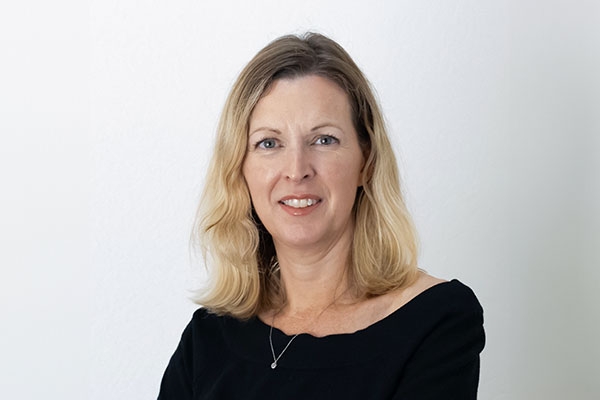During one of her classes in our Certificate Program in Human Resource Management, Géraldine Woloch-Addamine first had the germ of what would become her company, Good4work.
Géraldine was taking Effective Performance Management when she had an “a ha” moment. As part of the course work, she had to work on creating virtual teams using software solutions. “You start to develop norms,” she shares, “and rules that everyone can understand and use to build high-performing teams. That's how it all started.”
Two full years into the pandemic, remote work is the new normal and it's business critical to get effective distributed teams right. They need good managers and processes, and Géraldine has taken on that challenge with her startup.
Good4work offers team-engagement software to create a culture of trust, and is the culmination of a lot of hard work to understand what makes for effective team-building, and how to translate that knowledge into an easy-to-use software solution.
Meet New People
Already an HR professional in her native France, Géraldine, knew that it was “absolutely critical” for her to understand the business expectations of her adopted land.
Taking her first courses in the certificate, Géraldine noticed right away that U.S.-based educational methods were much different than those of France.
“Americans love to talk a lot about their experiences,” she says with a laugh, “and it's very practical in terms of learning because it's based on experience and it's basically learning by doing, which is very pragmatic.” In effect, part of the benefit of her Extension education was learning how to share her own experiences and use others' tales as a way of understanding how human resources work in the United States.
Those didactic conversations meant that her studies with us weren't just a business imperative, as she also gained from the experience of meeting people in her new culture. As an adult, Géraldine explains, “You go back to school because you want to make new friends, and it was like the first step for networking. It was also one of the best ones. It's really something that I highly recommend to anybody, to really invest that time in yourself.”
Flexible Work Paradigm
Now ensconced in the Bay Area, Géraldine immediately saw the personal benefits of a remote working environment in San Francisco's tech work culture. She saw people getting work done in cafes all over town, and she responded to that freedom of remote work. “I was dying to do the same," she admits. “I really wanted to have that flexibility.”
The idea of remote working hasn't been cutting edge for decades, of course. “We were already heading there,” Géraldine explains, “working toward a flexible workplace.” The previous expectations, however, were that building effective remote teams was a particular problem. Géraldine recalls with a laugh as she recounts an experience at a previous job, where the CEO prepared her for the task of managing a distributed team, making sure that she knew that it would be a difficult challenge. It was a big deal.
Putting the Human Into Human Resources
With work and home lives now blended, it becomes even more important for HR experts to understand that they need to understand more than just their employees’ work life. “As part of humanizing the workplace,” Géraldine stresses, “we have to bring our whole self into the process.
“It's more blurry in terms of our personal and professional life,” she continues. “We need to bring more of our whole self and it makes it more human because there's no other choice than leading with more empathy. If you don't, you lose some people and you quickly realize that it won't work.”
Frictionless Remote Work
Because of her experience and education, Géraldine points to some of the problems that remote work can engender. “We wanted to solve the virtual team dysfunctions of remote teams that limit collective productivity,” she shares. “Micromanagement, burnout, lack of motivation, lack of belonging.”
Géraldine also wanted to make the experience as smooth as possible. Rather than add yet another layer of complexity, Good4work created team-engagement software that works with one of the group’s favorite communication tools: Microsoft Teams or Slack.
She explains what’s in the toolbox: “It empowers team leaders to manage culture, recognition, performance and talent.”
Advice for the Future HR Professional
Géraldine is such a powerhouse that she hesitates when asked about what top three qualities an HR professional should have. You can almost see her sifting through the many possibilities before she lands on her final choices.
“It comes within this new context,” she confides, “where we need to deal with a lot of personal uncertainty. So for that reason, it's really important to have somebody with people skills. Understanding people is the first non-negotiable skill.”
Resiliency is another key skill that Géraldine sees in the best HR professionals, and she makes it clear that current events make it even more important. “We don't need to be perfect; we need to improve, especially in this new world where you need to build new processes from scratch, where you even need to create new values. The entrepreneurial mindset is to learn from failure, to be resilient in the face of failure.”
No surprise, Géraldine chooses communication as another key skill to develop. “I would say that that big change [working from home] is only reinforcing the strong skills of HR people, which is about being a great facilitator, a great communicator.”
_________________________________
Develop your own human resources skill set and discover a people-forward new career with the Professional Certificate in HR Management.



